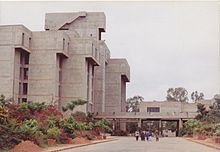ABOUT US :
Origin[edit]
The British government in India, shaken by several famines in India, set up a commission to improve the state of agriculture to reduce the impact of famines. This led to the Famine Commission of 1880 and in 1889 a commission was set up with Voelcker to examine agriculture in India. The report led the rulers of Mysore kingdom (The Wodeyars) to establish research units in the field of agriculture and donated about 30 acres (120,000 m2) of land to set up an Experimental Agricultural Station at Hebbal, and appointed German-Canadian chemist Adolf Lehmann in 1900 who began research on soil fertility at a laboratory that now houses the Directorate of Agriculture. About 30 acres of land was then acquired at Hebbal for experimental fields. Later in 1906, Leslie Coleman, a Canadian Entomologist and Mycologist succeeded Lehmann and served for 25 years.
What began on a 30-acre (120,000 m2) land was soon extended to about 1,300 acres (5.3 km2). The increasing reputation of this experimental station as a training center led to the foundation of the Mysore Agricultural College at Hebbal in 1946 affiliated to the Mysore University. This was soon followed by the Agricultural College at Dharwad in 1947 which was then affiliated to Karnataka University. In 1958, veterinary science as a discipline was started with the establishment of the Veterinary College at Hebbal also affiliated to Mysore University.
Formation[edit]
Administrative building of University of Agricultural Sciences, Bangalore, at Gandhi Krishi Vigyana Kendra also known as Naik Bhavan. The buildings were designed by Kanvinde who was trained in the Bauhaus School by Gropius.
In 1948 a University Education Commission had been started under S. Radhakrishnan with members that included Zakir Hussain and the American educationist J.J. Tigert, and Arthur Ernest Morgan. They examined the Land-Grant colleges of the United States as a potential model for rural and agricultural education. This recommendation was taken up in 1961 with the formation of an Indo-American team to develop the universities and their curriculum. This resulted in a first Joint Indo-American team in 1954 that studied American universities leading to US-AID supported collaboration between American and Indian universities. A second team was established in 1959 that made recommendations to make agricultural universities autonomous and to have veterinary, home science, and agricultural education on a single campus with integrated teaching, extension and research. This was followed by a committee headed by Ralph W. Cummings of the Rockefeller Foundation, along with Ephraim Hixon of the USAID, L. Sahai (Animal Husbandry Commissioner) and K.C. Naik as convener.[5] The then Mysore State Government through its Act No. 22 passed in 1963 provided for the creation of the University of Agricultural Sciences. The university came into existence on 21 August 1964 and was meant to serve the agricultural education needs of the state of Karnataka[2][3] with a campus that included the old experimental stations at Hebbal established by Lehmann and Coleman with an additional campus at GKVK added in 1969. K.C. Naik served as the first Vice Chancellor. The UAS was inaugurated on 21 August 1964 by Vice President of India Zakir Hussain in the presence of Chester Bowles, United States Ambassador to India and S. Nijalingappa, Chief Minister of Karnataka. On 12 July 1969, Prime Minister Indira Gandhi inaugurated GKVK campus with its buildings designed by the architect Achyut Kanvinde who was influenced by Walter Gropius.[2][3] The Ford Foundation made a grant of $331000 in 1966 to develop graduate research in entomology at the university.
The University initially included the agricultural colleges at Hebbal and Dharwad, the Veterinary College at Hebbal, the fisheries college at Mangalore, and 35 research stations located in different parts of the state following agroclimatic zonation and focus on specific crops along with 45 ICAR projects which were with the State Department of Agriculture, Horticulture, Animal Husbandry and Fisheries.
COURSES OFFERED :
B.Tech. in Agricultural Engineering
B.Sc. (Hons.) in Agriculture
B.Sc. (Hons.) in Agri Business Management
B.Tech. in Agricultural Engineering



